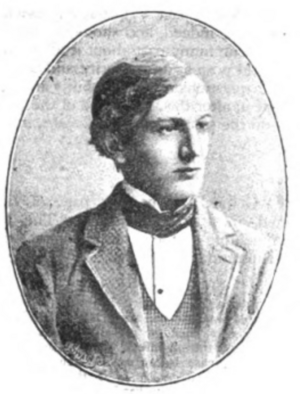Ruaraidh Erskine facts for kids
Ruaraidh Erskine of Marr (born January 15, 1869 – died January 5, 1960) was a Scottish activist and writer. He strongly supported Scottish independence and worked hard to bring back the Scottish Gaelic language. His full name in Scottish Gaelic was Ruaraidh Arascain is Mhàirr.
Contents
Early Life and Passions
Ruaraidh Erskine was born in Brighton, England, on January 15, 1869. His birth name was Stuart Richard Joseph Erskine. He was the third of four children. His father, William Macnaghten Erskine, was an army officer.
Erskine said he learned Scottish Gaelic from his nanny when he was a child. She came from Harris, an island in Scotland. This early experience made him very passionate about the language. He dreamed of a Scotland that could govern itself, especially one that celebrated its Celtic roots.
He believed that helping more people speak and write Gaelic was important. He wanted to see more Scottish Gaelic literature written. He hoped this would make the language stronger and more respected.
Journalism and Political Ideas
In 1890, Erskine helped start a weekly newspaper called The Whirlwind. It lasted less than a year but featured works by famous artists. The paper supported nationalism (the idea that a country should be independent) and Irish Home Rule (Ireland governing itself). It was also against women getting the right to vote and against socialism (a system where the community controls resources).
Erskine also supported a political idea called Jacobitism. This was about bringing back the House of Stuart royal family to the throne. In 1891, he helped create the Legitimist Jacobite League of Great Britain and Ireland. He was the leader of this group several times.
He tried to become a Member of Parliament for the Buteshire area in 1891. He called himself a "Scottish Tory Home Ruler," meaning he wanted Scotland to have more control over its own affairs while still being part of the UK. However, he later withdrew from the election.
Erskine continued his work in journalism. In 1901, he started editing Am Bàrd, a newspaper that used both English and Gaelic. From 1904, he launched Guth na Blaidhna (Voice of the Year). This magazine promoted the Scottish Gaelic language, Catholicism, and Scottish independence. It was published for 21 years. He also published Alba, a weekly Gaelic newspaper, from 1908 to 1909. It covered topics like land, farming, fishing, and Gaelic education.
In 1914, he brought back The Scottish Review magazine. This journal became more left-leaning and nationalist. It featured writers who supported workers' rights and Scottish independence.
Championing Scottish Independence
At just 23 years old, in 1892, Erskine became a leader in the Scottish Home Rule Association. However, he soon decided that he wanted full Scottish independence, not just more control within the United Kingdom.
In his magazine Guth na Bliadhna, he pushed for Scotland to become independent. He also called for Scottish and Irish people to work together. He believed they should help each other make their languages the official languages of their countries. He also used the magazine to suggest forming a political party to fight for independence.
In 1920, Erskine and William Gillies formed the Scots National League (SNL). This was a step towards creating a Scottish nationalist political party.
Even though Erskine came from a wealthy family, he connected with John Maclean, a socialist who also wanted an independent Scotland. At first, Erskine didn't like socialism, but by the time of World War I, his political views became more radical. He started to agree with people like Maclean.
Erskine supported the Easter Rising in Ireland in 1916, which was an attempt by Irish nationalists to gain independence. He tried to build connections with Irish nationalists. He even tried to start a joint Scottish-Irish Celtic newspaper with Art O'Brian, the leader of the Irish Self Determination League.
After World War I, Erskine tried to get Scotland its own representation at the Paris Peace Conference. He wasn't successful, but he gained support from important figures like James Maxton.
In 1928, Erskine and Gillies led the SNL to join other groups to form the National Party of Scotland (NPS). However, the NPS had different ideas from the SNL. Many SNL members, including Erskine, left the NPS because of these differences. After this, Erskine was less involved in politics.
Some of Erskine's ideas, like Scottish independence and land reform, have become more popular over time. His idea of pan-Celticism (unity among Celtic nations) is still discussed by groups like the Celtic Congress.
Personal Life
Ruaraidh Erskine married Muriel Lilias Colquhoun Graham on July 18, 1891.
See also
 | Bayard Rustin |
 | Jeannette Carter |
 | Jeremiah A. Brown |


